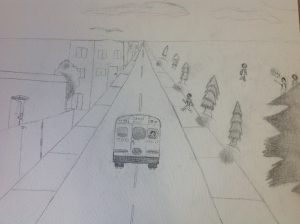From the moment their guest speaker shared what it was like going to a segregated school in Alexandria, students knew that they wanted to share personal stories of history with a wide audience. Taking inspiration from StoryCorps, Students interviewed several different adults about their lives in order to better understand how historical events impact personal lives. In addition to contacting individuals, preparing interview questions, and recording each interview, students designed artwork and websites to highlight these fascinating stories. Learn more about this project here: Celebrating Hands-on Learning Through Community Service.
Cohort member: Brittany Feiler
Students: 7th grade United States History 1865-present at George Washington Middle School
Essential Question:
How can individual stories shape our understanding of history?
How can we share people’s stories with others?
Standards:
USII.1 The student will demonstrate skills for historical and geographical analysis and responsible citizenship, including the ability to
a) analyze and interpret primary and secondary source documents to increase understanding of events and life in United States history from 1865 to the present;
b) make connections between the past and the present;
c) sequence events in United States history from 1865 to the present;
d) interpret ideas and events from different historical perspectives;
USII.9 The student will demonstrate knowledge of the key domestic and international issues during the second half of the twentieth and early twenty-first centuries by
a) examining the Civil Rights Movement and the changing role of women;
USII.8 The student will demonstrate knowledge of the economic, social, and political transformation of the United States and the world between the end of World War II and the present by
c) identifying the role of America’s military and veterans in defending freedom during the Cold War, including the wars in Korea and Vietnam, the Cuban missile crisis, the collapse of communism in Europe, and the rise of new challenges;
d) describing the changing patterns of society, including expanded educational and economic opportunities for military veterans, women, and minorities;


